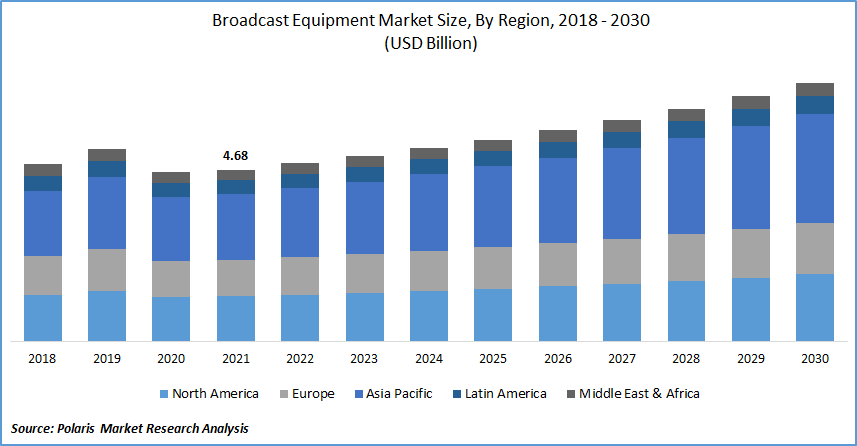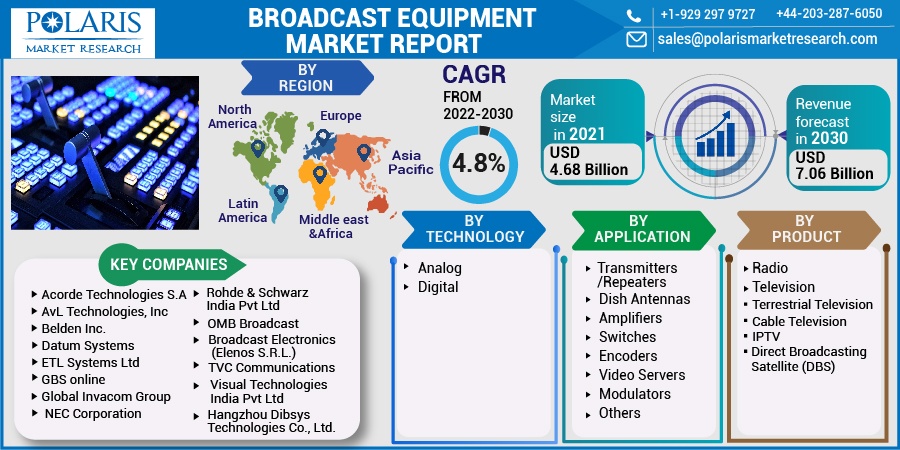
Broadcast Equipment Market Share, Size, Trends, Industry Analysis Report, By Technology (Analog Broadcasting, Digital Broadcasting); By Application (Radio, Television); By Product; By Region; Segment Forecast, 2022 - 2030
- Published Date:Jun-2022
- Pages: 111
- Format: PDF
- Report ID: PM2429
- Base Year: 2021
- Historical Data: 2018 - 2020
Report Outlook
The global broadcast equipment market was valued at USD 4.68 billion in 2021 and is expected to grow at a CAGR of 4.8% during the forecast period. The key factors, such as technological advancements in digital equipment such as installing IoT, AI, and cloud-based platforms, are driving the broadcast equipment market growth during the forecast period.
 Know more about this report: Request for sample pages
Know more about this report: Request for sample pages
The telecast studio equipment and the surrounding environment have undergone a major transformation from simple and static to effective and driven by quality content. There's also been an increase in displaying and interested audiences moving to non-traditional systems to deliver content and break down barriers. Computers and portable electronic gadgets, iPads, and smartphones can be found in the industry. Also, the major players are focusing on the launches of advanced services, assisting the growing broadcast equipment market. For instance, in May 2021, EVS announced the official launch of XtraMotion.
This cloud-based on-demand assistance uses artificial intelligence (AI) to convert any video content into extremely slow replays. XtraMotion was created to assist presenters in improving the viewing experience by introducing new super slow-motion capabilities efficiently and cost-effectively. Furthermore, Artificial Intelligence (AI) has played a significant role in strengthening and transforming industries all over the world. AI is used by various entities across multiple platforms, ranging from governmental bodies to large organizations to small online businesses. AI is being used in the industry to make visual content more interactive and interesting.
AI can be used in FM radio stations to monitor illegal telecast and record its frequency. Such factors are increasing the use of AI-based technologies and fueling the development of the telecasting equipment market. However, one of the major factors impeding this equipment market's ability to grow and expand by the forecasted figures is the continued presence of a speed and variation gap.
Industry Dynamics
Growth Drivers
The key factor, such as investment by the various sports associations in the telecasting events, is driving the broadcast equipment market growth. Sports associations are making various investments in airing different sporting activities. For example, the International Federation of Sport Climbing formed a partnership with four telecast partners, including Sport5, SRG-SSR, RAI Sport, and Zhibo.tv, to telecast IFSC Cup and World competitions in 2021, either live or postponed. This increases infrastructure investments to reach a larger audience.
Digital broadcasters are also making investments in D2C content enhancements for linear TVs, such as paramount+, Disney+, discovery+, and OTT, trying to offer that help boost infrastructure television program development. Their strategies include ensuring that all D2C platform content is aired on sequential TV channels.
However, broadcasters are still debating and planning whether to show the content on D2C first and then on free to air later or to demonstrate some content on free to air first and then the full content on D2C. Further, in December 2021, Zee Entertainment attained the broadcast rights for the Emirates Cricket for UAE T20 tournament for ten years. The broadcaster would then pay the league a rights fee of USD 15 million per year. As a result, the overall value of the agreement is USD 150 million over the span of ten years. Such instances contribute to the telecast equipment industry expansion.

Know more about this report: Request for sample pages
Report Segmentation
The market is primarily segmented based on technology, product, application, and region.
|
By Technology |
By Product |
By Application |
By Region |
|
|
|
|
Know more about this report: Request for sample pages
Insight by Technology
Digital broadcasting is anticipated to garner revenue share in the global market. Its norms significantly raise transmission internet bandwidth by enhancing spectrum efficiency. DTT generally allows between 4 and 18 services to be accepted in an equivalent frequency band used for one analog TV service. It has gained wide acceptance, particularly in digital television applications such as terrestrial television and satellite TV.
Based on the product type, the encoders segment holds the largest share. In digital telecasting, encoders are widely used. The growing demand for UHD information production and transmission has been identified as one of the major factors driving the growth. Furthermore, the growing number of digital channels is expected to provide significant growth opportunities for both established and emerging telecast equipment ecosystem actors in the near future.
Geographic Overview
North America had the largest revenue share. North America has experienced significant growth and is expected to provide numerous growth opportunities to vendors over the forecast period. Rising demand for UHD content creation and transmitting has been identified as one of the primary factors pushing telecast equipment market growth in North America.
Furthermore, increasing smartphone and website penetration in the country is driving this telecast equipment market growth. Strong growth for ultra-high-definition content and an increase in digital channels are expected to provide significant growth opportunities for both emerging and established market players.
Moreover, Asia Pacific is expected to witness a high CAGR in the global market. These regions have emerged as a global hotspot for massive investments and business expansion opportunities. The growing adoption of High-Definition (HD) content, the transition from analog to digital telecasting, and the availability of on-demand substance via OTT platforms are the major drivers of growth in the regional market.
This expansion can be attributed primarily to investments made by domestic and multinational entertainment and media companies throughout the region. Furthermore, there has been a steady increase in the adoption of digital equipment all over radio and television applications in India. In addition, due to an increase in demand for digital content all over various broadcasting channels, India is a promising area for digital technology. As developers seek cost-effective solutions, demand for digital equipment market is expected to skyrocket.
Competitive Insight
Some of the major players operating in the global market include Acorde Technologies S.A, AvL Technologies, Inc, Belden Inc., Broadcast Electronics (Elenos S.R.L.), Datum Systems, ETL Systems Ltd, GBS online, Global Invacom Group, Hangzhou Dibsys Technologies Co., Ltd., NEC Corporation, OMB Broadcast, Rohde & Schwarz India Pvt Ltd, Shanghai Teng Guang Broadcasting Equipment Co., Ltd., TVC Communications, and Visual Technologies India Pvt Ltd.
Broadcast Equipment Market Report Scope
|
Report Attributes |
Details |
|
Market size value in 2021 |
USD 4.68 Billion |
|
Revenue forecast in 2030 |
USD 7.06 Billion |
|
CAGR |
4.8% from 2022 - 2030 |
|
Base year |
2021 |
|
Historical data |
2018 - 2020 |
|
Forecast period |
2022 - 2030 |
|
Quantitative units |
Revenue in USD billion and CAGR from 2022 to 2030 |
|
Segments covered |
By Technology, By Product, By Application, By Region |
|
Regional scope |
North America, Europe, Asia Pacific, Latin America, Middle East & Africa |
|
Key companies |
Acorde Technologies S.A, AvL Technologies, Inc, Belden Inc., Broadcast Electronics (Elenos S.R.L.), Datum Systems, ETL Systems Ltd, GBS online, Global Invacom Group, Hangzhou Dibsys Technologies Co., Ltd., NEC Corporation, OMB Broadcast, Rohde & Schwarz India Pvt Ltd, Shanghai Teng Guang Broadcasting Equipment Co., Ltd., TVC Communications, and Visual Technologies India Pvt Ltd |
